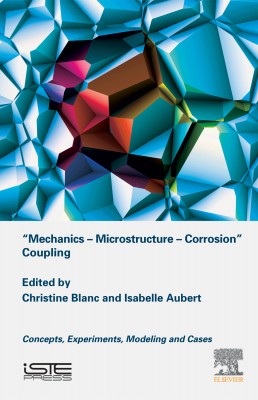
In 2018, the CNRS Thematic School “M2Corr” (“Mechanics – Microstructure – Corrosion”) brought together some one hundred people around the theme of coupling between mechanics, microstructure and corrosion, under the aegis of CNRS and CEFRACOR. Experts from various academic institutions and stakeholders from a range of industrial sectors discussed and analyzed the state of the art of scientific and technological developments related to the durability of materials and structures subjected to mechanical and environmental stress, coupled or decoupled. The experimental, theoretical and numerical aspects were discussed at different scales.
This book, consisting of 22 chapters summarizing the courses taught at this school, provides its readers with the most advanced tools and scientific approaches to:
– apprehend the phenomena of coupling by understanding the associated mechanisms, and to identify the variables of the first order among those related to the mechanical state, the material or the chemical environment; and
– propose strategies to control and/or extend the life of structures in a multi-process coupling situation.
1. Environmentally Assisted Cracking: Some Critical Aspects, Pierre Combrade.
Part 1. The Basics for Understanding Mechanics–Environment–Microstructure Couplings
2. The Basics to Better Understand Couplings in Physical Metallurgy, Mohamed Gouné, Éric Andrieu, Yves Bréchet, Alexis Deschamps,
Joël Douin, Marc Fivel and Angéline Poulon-Quintin.
3. Continuum Mechanics, Philippe Pilvin.
4. Fatigue Crack Initiation and Propagation, Véronique Doquet, Gilbert Hénaff, Thierry Palin-Luc and Marion Risbet.
5. Surface Chemistry and Passivation of Metals and Alloys, Philippe Marcus, Élie Protopopoff and Vincent Maurice.
6. Electrochemistry for Mechanically-assisted Corrosion, Sabrina Marcelin, Bernard Normand, Roland Oltra and Vincent Vivier.
7. Modeling Tools: From the Atom to the Macroscopic Scale, Charlotte Becquart, Christophe Domain, Marc Fivel, Michel Perez
and Ludovic Thuinet.
Part 2. Hydrogen and the Embrittlement of Metallic Materials
8. State of Hydrogen in Matter: Fundamental Ad/Absorption, Trapping and Transport Mechanisms, Frantz Martin, Xavier Feaugas,
Abdelali Oudriss, Döme Tanguy, Laurent Briottet and Jean Kittel.
9. Hydrogen and Crystal Defects Interactions: Effects on Plasticity and Fracture, Xavier Feaugas and David Delafosse.
10. Industrial Consequences of Hydrogen Embrittlement, Laurent Briottet, Rémi Batisse, Pierre Bernard, Claude Duret-Thual, Jean-Loup Heuzé, Frantz Martin, Florian Thebault and Flavien Vucko.
11. Experimental Techniques for Dosage and Detection of Hydrogen, Abdelali Oudriss, Frantz Martin and Xavier Feaugas.
Part 3. Stress Corrosion Cracking
12. Effect of Stress/Strain Fields on Electrochemical Activity: Metallurgy/Stress Interaction and Surface Reactivity, Vincent Vignal, Olivier Devos and Xavier Feaugas.
13. Stress Corrosion Cracking. Between the Corrosion Defect and the Long Crack: the Phase of the Initiation of the Cracks, Christine Blanc,
Juan Creus and Marie Touzet–Cortina.
14. Stress Corrosion Crack Propagation, Catherine Guerre, Marion Frégonèse, Quentin Auzoux, Isabelle Aubert and Cécilie Duhamel.
15. Oxidation-assisted Cracking, Benoît Ter-Ovanessian, Aurélien Villani, Éric Andrieu and Samuel Forest.
16. Stress Corrosion Cracking: From In-service Cracking to Laboratory Studies, Krzysztof Wolski, Pierre Combrade, François Dupoiron,
Claude Duret-Thual and Fiona Ruel.
Part 4. Corrosion Fatigue
17. Corrosion and Hydrogen Fatigue at Different Scales, Nicolas Saintier, Mohamed El May, Grégory Odemer, Gilbert Hénaff, Cédric Bosch, Xavier Feaugas and Thierry Couvant.
18. Local-scale Modeling of Plasticity–Environment Interactions, Isabelle Aubert, Jamaa Bouhattate, Yann Charles, Thierry Couvant,
Matthieu Dhondt, Cécilie Duhamel, Marion Frégonèse, Monique Gaspérini, Gilbert Hénaff, Arnaud Metsue and Nicolas Saintier.
19. Specific Cases of Corrosion Fatigue, Cédric Bosch and Nathalie Pauze.
Part 5. Additional Information and the Paths to Solving Interrelated Problems
20. Local Electrochemical Methods Adapted to Studying Environment–Microstructure–Mechanics Couplings, Olivier Devos, Nadine Pébère, Vincent Vignal and Vincent Vivier.
21. Mechanical Tests in Corrosive Environments and Under Gaseous Hydrogen, Cédric Bosch, Laurent Briottet, Thierry Couvant,
Marion Frégonèse and Abdelali Oudriss.
22. Liquid Metal Embrittlement, Thierry Auger, Jean-Bernard Vogt and Ingrid Proriol Serre.
Christine Blanc is Professor at ENSIACET – INP Toulouse, University of Toulouse, France. She is a researcher at CIRIMAT where her work focuses on the coupling between microstructure, the environment and stress states.
Isabelle Aubert is Assistant Professor at the University of Bordeaux, France. Her research at I2M focuses on the issues of coupling between mechanics, microstructure and the environment.